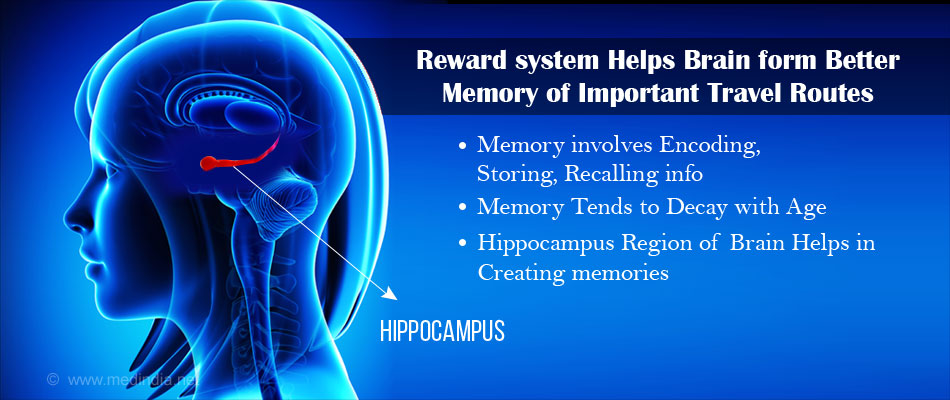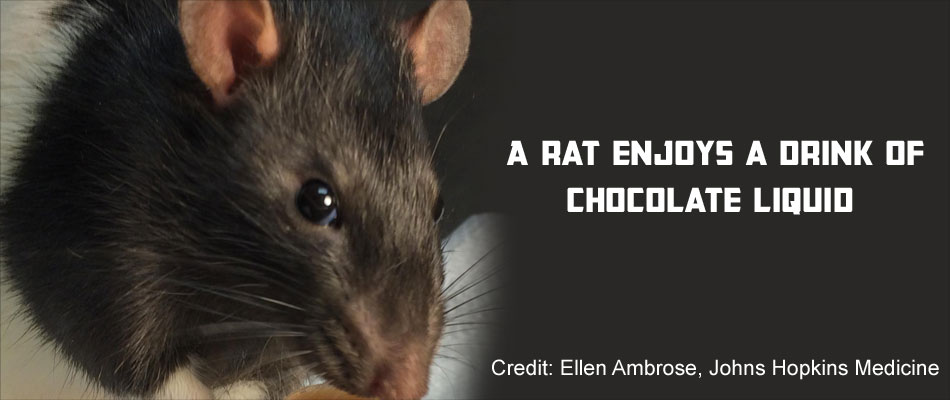
- The region of the brain called hippocampus is responsible for formation and storage of memories and in spatial relations.
- To remember a travel route between 2 random points, the brain should therefore create memories that help navigation in both the onward as well as the return direction.
- Studies in rats have shown that if there is a ‘reward’ at the end of the trip, the neurons in the hippocampus replay the route taken to get the reward, but backwards.
- Importantly, these ‘replays’ and creation of memories only occur when the brain waves calm down or the animal is in a relaxed state.
Memory and Where It Is Formed in the Brain
Memory is what helps in recognizing people, places, knowing where we are, and who we are to mention a few. It makes us feel happy or sad and in short is very essential for going on about our daily routine and activities without bungling. The hippocampus region of the brain is critical for forming and storing memories and in spatial relations (being aware of the location of a specific object in relation to another object).This report deals with one such important aspect of memory, namely how mammals remember important travel routes.
How the Rat Remembers Where to Find the Cheese
Neuroscientists at the Johns Hopkins University believe that they are closer to understanding how the brains of some mammals (rats, in this case) are able to find their way or navigate certain routes better.
The presence of a reward at the end of the trip (a chocolatey drink in this study) made the hippocampal neurons in the rats brain replay the route taken to achieve the reward, but ‘backwards’.
The magnitude of the reward contributed too. The greater the reward, the more number of times the animals replayed the route, helping to solidify the memory in their brain.
Give Me Some Time – I Need to Remember
More importantly, these memory creations or ‘replays’ happened only when the rats paused or took a break between their travels. This was established by recording the brain waves.It was during these slow wave periods that lasted around one-tenth of a second that the ‘replays’ occurred. These replays occurred in the neurons of the hippocampus called place cells.
How the Study Was Actually Done
The study was conducted by Dr. Foster, associate professor of neuroscience at the Johns Hopkins University School of Medicine.The rats were made to run back and forth along a linear track between 2 points A and F.
Interestingly, even before starting to scurry about, the rats actually “envisioned” their routes through the sequential firing of their place cells. Sometimes, during pauses, rats replayed the sequences in reverse, but scientists did not know why.
While the rats were running, the activity of more than 100 place cells in the hippocampus was monitored by placing around 40 miniature wires (thinner than a human hair) in the hippocampus of the rat.
During trial runs, the rats were sometimes provided with a chocolatey liquid reward at either point A or point F. However, it had no effect on the frequency of forward or backward replays.
A rat enjoying its reward at F would experience an equal number of forward and backward replays in any random sequence.
However, when the amount of reward was altered at point F, number of forward replays remained the same, but the number of reverse replays increased or decreased in proportion with the change in the reward.
This led scientists to conclude that this change in frequency of backward replays could probably mean that the rats’ brain was linking the reward with the path taken to obtain it, creating and solidifying that memory for future recall.
Transposing the Results to Humans
Scientists believe that even humans could also remember certain routes better using the same mechanism.Consider an instance of a person shipwrecked on an island, wandering off and stumbling upon a stream containing fresh and tasty water. He does not know how he reached that spot but now it is important that he remember the route.
To help him do so, his hippocampal neurons would replay the route backwards and help him recall otherwise unimportant details on the way that helped him in getting to the stream (the reward).
Dr. Foster says a lot more research is necessary to learn details about the result of these reverse replays, and if their findings do indeed apply to humans as well.
However, there is no countering the fact that one does definitely need to take a break from the rat race to enjoy the finer things in life. It is during these periods of relaxation that such ‘replay’ events occur, helping to create and store memories of certain routes deemed important. In addition these periods do wonders for one’s overall well-being and health.
References:
- Mechanisms for widespread hippocampal involvement in cognition - (http://www.ncbi.nlm.nih.gov/pmc/articles/PMC4065494/)













